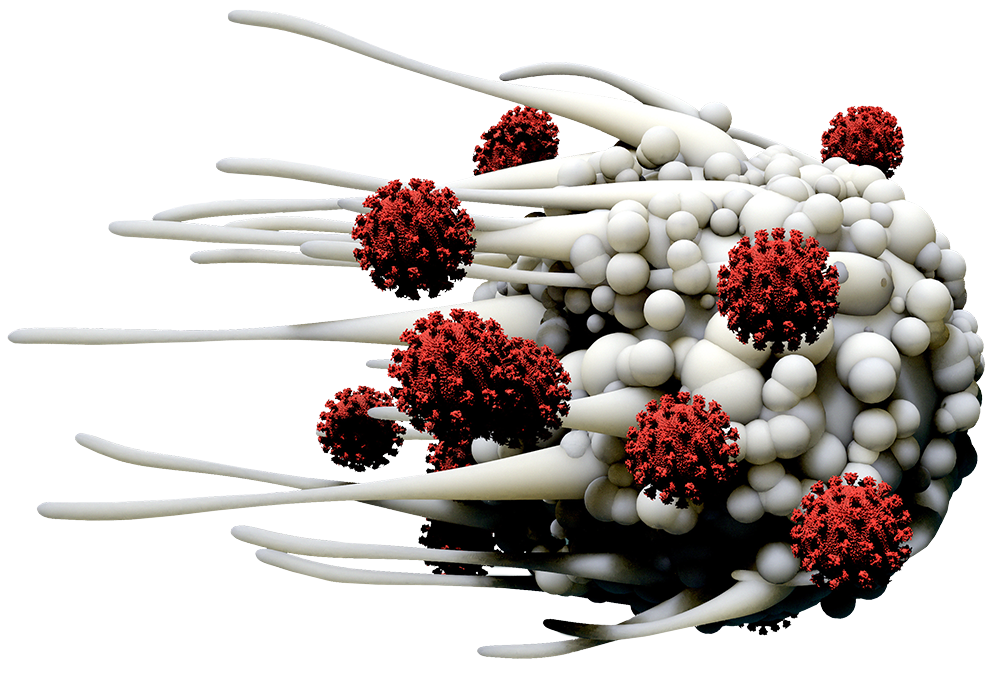Les chercheurs et conseillers soutenus par le GTIC, ainsi que les responsables de la santé des gouvernements fédéral, provinciaux et territoriaux, se sont réunis à Vancouver pour la Réunion scientifique du GTIC au début du mois de mars 2023. L’objectif était de partager les résultats de la recherche et les leçons tirées de trois années de pandémie de COVID-19.
Près de 70 chercheurs et stagiaires ont présenté des résultats de recherche originaux sous forme d’affiches électroniques accompagnés de vidéos explicatives. Nous avons téléchargé un grand nombre de ces affiches et des vidéos qui les accompagnent ci-dessous et nous en ajouterons d’autres au fur et à mesure que les équipes de recherche nous donneront l’autorisation de les partager publiquement. Nous avons téléchargé un grand nombre de ces affiches et des vidéos qui les accompagnent (en anglais seulement). Les présentations d’affiches offrent un aperçu intéressant des connaissances acquises grâce au financement du GTIC.
MILIEUX COLLECTIFS
Cohortes professionnelles et éducatives
Mental health and life satisfaction among Canadian paramedics during the COVID-19 pandemic
Characterizing SARS-CoV-2 vaccine and post-infection humoral and soluble immune responses
Innate immune competence of persons with SARS-CoV-2 infection during the fifth wave in Quebec City
The impact of COVID-19 on the health of physicians, nurses and other healthcare workers: An interprovincial cohort study
Seroconversion and pseudo-neutralization in a cohort of food and retail workers in the Québec City region.
Tracking COVID-19 for Safer Schools study: How robust contact tracing and serology data helped support evidence-based public health decisions and school policies for the children and youth in British Columbia during the COVID-19 pandemic
Canadiens âgés et résidents d’établissements de soins de longue durée
Descriptive analysis of post-vaccination anti-SARS-CoV-2 antibody levels among long-term care facilities residents and incidence of COVID-19
Prospective Decentralized Study Evaluating the Impact of Age on Antibody Responses to COVID-19 Vaccines in Community Dwelling Adults to 48 weeks Post Primary Vaccine Series
CMV infection in long term care residents alters global immunologic phenotype but not primary SARS-CoV-2 response
Établissements correctionnels
Neutralization of Omicron Subvariants BA.5 and BQ.1 After Four COVID-19 Vaccine Doses in PLWH Receiving ART
The Serologic Prevalence of SARS-CoV-2 Amongst Incarcerated Persons in Provincial Correctional Facilities in Saskatchewan

MOBILISATION DES CONNAISSANCES
Politique et prise de décision
Timeliness of reporting of SARS-CoV-2 seroprevalence results and their utility for infectious disease surveillance
Accuracy of self-reported COVID-19 vaccination status compared to a public health vaccination registry
Engagement communautaire
The Wellness Hub: Assessment of long-term care homes’ and retirement homes’ during the COVID-19 pandemic to inform a responsive, community of practice intervention
Co-creating implementation strategies to mitigate SARS-CoV-2 exposure risks and facilitate wellness in long-term care and retirement homes: Wellness Hub
Research recruitment and consent methods in a pandemic: A qualitative study of COVID-19 patients’ perspectives
Lessons learned: Mechanics of operating a large-scale COVID-19 immunity study in long-term care residents

PÉDIATRIE
Infections à la COVID-19 et autres maladies associées dans la population pédiatrique
Factors associated with SARS-CoV-2 testing and test positivity in children and parents: A longitudinal cohort study
Waning antibody immunity against respiratory syncytial virus (RSV) during the COVID-19 pandemic and subsequent resurgence of RSV cases in young children
Dépistage, vaccination et interventions non pharmaceutiques liés à COVID-19 dans la population pédiatrique
Factors associated with COVID-19 vaccination in young children: A cohort study
Parental setting of routines, limits, and child screen time during COVID-19: A cohort study
Parents’ perspectives on COVID-19 vaccinations for children: “I am not an anti-vaxxer. I am just trying to gather information and make the best decision.”
Temporal trends in adherence to non-pharmaceutical interventions among children and parents in the Greater Toronto Area
Changes in pediatric movement behaviours during the COVID-19 pandemic by stages of lockdown in Ontario, Canada: A longitudinal cohort study

POPULATIONS PRIORITAIRES
Vaccination dans les populations de patients à haut risque
3rd and 4th doses of vaccines broaden and stabilize immunity to SARS-CoV-2 in immunocompromised patients with immune-mediated inflammatory diseases
Three doses of COVID-19 vaccines in people with HIV: Immunogenicity and effects on HIV reservoir
The Vaccine Immunogenicity and Safety in ImmunoDeficient patients (VISID) study: Immunological responses of patients with primary and secondary immunodeficiencies to SARS-CoV-2 BNT162b2 and mRNA-1273 vaccines, and breakthrough infections in Canada
SARS-CoV-2 vaccine-induced T-cell response after three doses in people living with HIV on antiretroviral therapy compared to seronegative controls (CTN 328 study)
Dynamics of cellular immune responses elicited by COVID-19 vaccines in older adults and people living with HIV receiving suppressive ART
Gestion de cas dans les populations de patients à haut risque
Frailty, age and outcomes of hospitalized adults differ across waves of the COVID-19 pandemic: A report from the Canadian Immunization Research Network (CIRN) Serious Outcomes Surveillance (SOS) Network
Vaccination pendant la grossesse
Impacts of the COVID-19 pandemic among 2SLGBTQQIA+ populations in Canada
SARS-CoV-2 antibody seropositivity among gay, bisexual, and other men who have sex with men (GBM) in Montreal, Toronto, and Vancouver and the role of living with HIV (LWH)
Neighbourhood marginalization as a social determinant of health for SARS-CoV-2 outcomes in Canadian emergency departments

SYNDROME POST-COVID
Long COVID prevalence from Omicron BA.1/1.1: National cohort study of Canadian adults
Effect of vaccination on post-acute COVID-19 sequelae (PACS): A cross-sectional study
Evaluation of immune cell exhaustion, tolerance and metabolism in Post-Covid Condition

IMMUNOLOGIE DE LA COVID-19
Enquête sérologique auprès de la population générale
SeroTracker: Lessons learned to optimize serosurveillance platforms and methodology for COVID-19 and other respiratory viruses
Global SARS-CoV-2 seroprevalence from January 2020 to April 2022: A systematic review and meta-analysis of standardized population-based studies
Inferring the incidence of SARS-CoV-2 infection from wastewater and serological data
Réponse immunitaire au SARS-CoV-2
Determining SARS-CoV-2 infection rates by nucleocapsid seropositivity in a vaccinated population with high seroprevalence
Investigation of the interplay between sex and age in antibody responses to SARS-CoV-2 infection and vaccination

VACCIN ET IMMUNITÉ
Immunologie des vaccins
Systemic and mucosal immune responses are variably induced in response to SARS-CoV-2 mRNA vaccination in a healthy pediatric cohort
Initial spike-specific Th1-like responses to mRNA vaccination against SARS-CoV-2 correlate with the durability of serological neutralizing antibody titers
Humoral immune responses to hybrid immunity and heterologous COVID-19 vaccination: A Stop the Spread Ottawa (SSO) analysis
Intranasal immunization of HD-Ad-FS induces robust systemic and airway mucosal immunities against SARS-CoV-2 and variant infection in mice and hamsters
Profiling antibody immunity to SARS-CoV-2 vaccination
Humoral responses to bivalent vs. monovalent vaccine boosters in Canada: A Stop the Spread Ottawa (SSO) comparative analysis
Comparison of SARS-CoV-2 antibody response by demographic and clinical characteristics following natural infection and vaccination: The CANCOV study.
Sécurité et efficacité des vaccins
COVID-19 vaccine effectiveness by vaccine administration schedule: A CCEDRRN study
Protective effectiveness of prior SARS-CoV-2 infection and hybrid immunity against Omicron infection and severe disease: A systematic review and meta-regression
Immunogenicity and adverse events following immunization with alternate schedules of authorized COVID-19 vaccines in Canada: MOSAIC study (Mix and match of the second cOvid-19 vaccine dose for SAfety and ImmunogeniCity: a Canadian Immunization Research Network Study (CIRN)
Vaccine Effectiveness against Omicron hospital admission and severe outcomes: a report from the CIRN Serious Outcomes Surveillance Network
Are post-vaccination antibody levels correlated with protection against COVID after household exposure?
A multiprovincial analysis of the incidence of myocarditis or pericarditis after mRNA vaccination by varying dosing intervals, compared to the incidence after SARS-CoV-2 infection: a Canadian Immunization Research Network (CIRN) study.
What is serosurveillance and why is it important?
Serosurveillance is a common way of seeing how many people have been previously infected with a certain infectious agent, in this case SARS-CoV-2, the virus causing COVID-19. Blood samples from hundreds of thousands of Canadians are currently being tested to check levels of antibodies, which suggest a past infection. Serosurveillance can also help determine priority groups for vaccination and will be used to monitor the effectiveness of vaccines.

What does “vaccine surveillance” mean?
Vaccine surveillance includes studies of vaccine effectiveness (how good vaccines are at preventing severe disease, new infections, and transmission) and safety (identifying and quantifying the vaccine adverse effects). Although vaccines go through numerous trials before being approved for use, it is crucial to monitor their effectiveness and safety within a broader population and with various population groups (children, pregnant women, elderly, etc.).
See all FAQs

